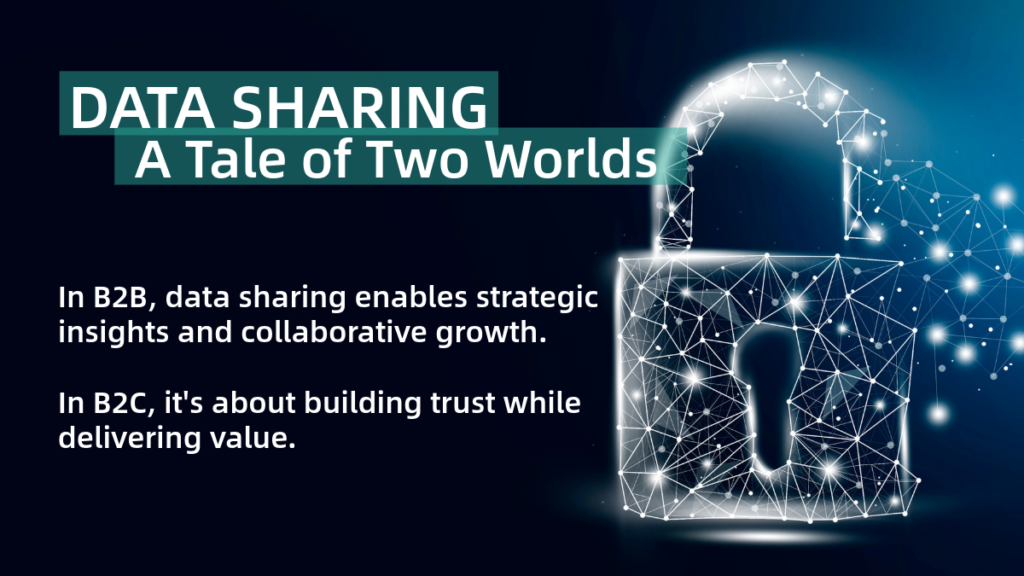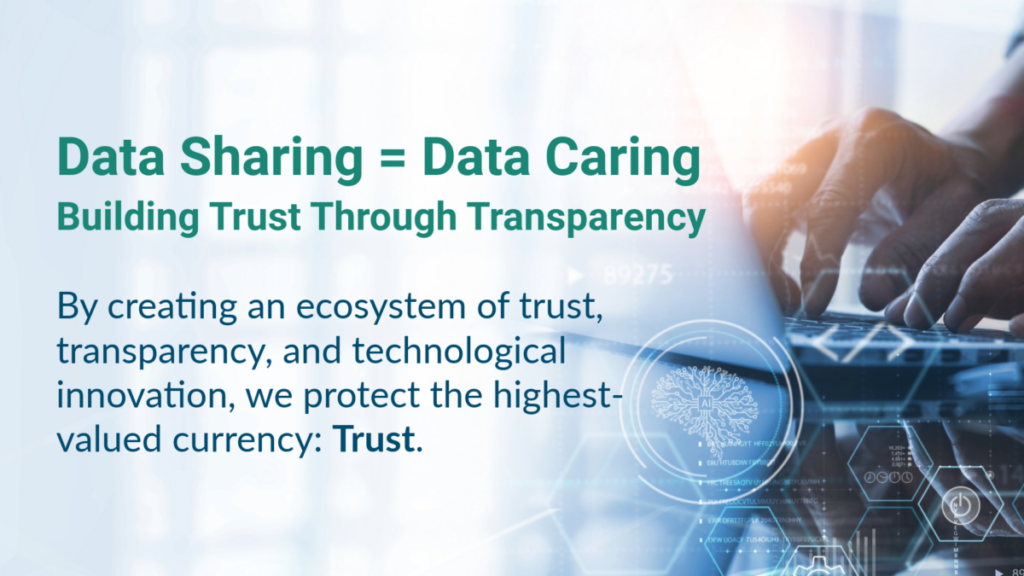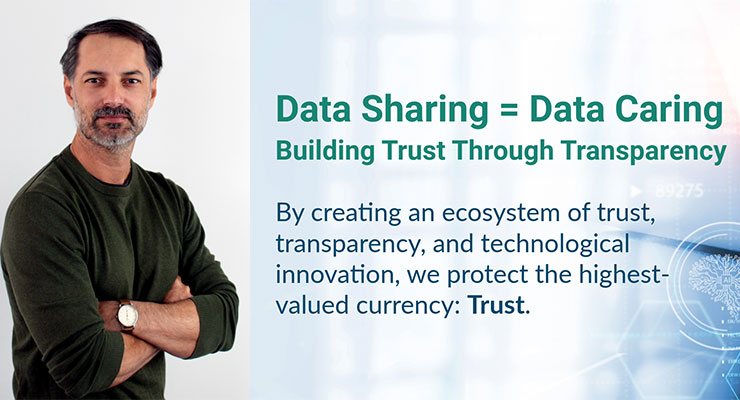There was a time when real estate decisions were made based on hunches, intuition, and legacy experience. Those days are gone. The commercial real estate industry is now an intricate web of real-time data, algorithmic insights, and predictive analytics. We no longer speculate; we measure. But just as we begin to unlock the full potential of data-driven intelligence, we find ourselves held back—not by technological limitations but by overly strict regulations and a misguided obsession with compliance over innovation.
Welcome to the paradox of the digital age: we have more data than ever before, but we are increasingly afraid to use it.
What Does ‘Data Sharing = Data Caring’ Really Mean?
The phrase ‘Data Sharing = Data Caring’ is more than a catchy slogan—it’s a call to action. It represents a fundamental shift in data management—transforming information from a transactional commodity to a strategic asset of shared value. In commercial real estate, the divide is clear:
- Data sharing is transactional. It involves providing stakeholders with access to insights—foot traffic, tenant sales, occupancy rates—so they can use them to make better decisions.
- Data sharing is strategic. It ensures that data is available, ethical, secure, and mutually beneficial, empowering businesses and consumers while maintaining trust. This means implementing robust data governance frameworks that protect individual privacy while enabling collaborative innovation.
This distinction is crucial in B2B and B2C contexts, where how data is collected, stored, and utilized directly impacts innovation, privacy, and business success.
The Evolution of Data in Retail Real Estate
Shopping centers are no longer static retail hubs but living, breathing ecosystems. Foot traffic, tenant sales, dwell times—each transaction, each movement generates valuable insights that could revolutionize property management. Yet, instead of seamlessly integrating this wealth of data into smarter business strategies, many in the industry hesitate, bound by fear of misstepping in the regulatory minefield.
The reality is simple: data sharing fuels growth. The challenge? The laws designed to ‘protect’ consumers are often the very barriers that prevent meaningful progress.
Consider the absurdity: A mall owner can install state-of-the-art occupancy sensors to ensure safety. However, when they try to use that same data to optimize tenant mix or enhance visitor experiences, they encounter compliance roadblocks and legal ambiguity.
The result? Retail stagnation. Landlords are left in the dark, retailers are deprived of actionable insights, and consumers continue to suffer from subpar, generic shopping experiences.

B2B: Strategic Data Collaboration vs. The Red Tape Reality
B2B data sharing should be a no-brainer. Retailers and shopping centers stand to gain when they pool their insights—improving leasing strategies, optimizing staffing, and refining marketing tactics. And yet, many companies refuse to engage in even the most basic data exchanges due to a climate of legal paranoia.
- Optimizing tenant mix through performance insights? Too risky.
- Sharing footfall trends with retailers? Better lawyer up.
- Integrating smart building data to enhance operations? Compliance teams say no.
Instead of fostering an environment where businesses can responsibly leverage data for growth, we’ve created a bureaucratic maze that stifles innovation in favor of legal self-preservation.
This is where big tech thrives. They own the playing field, write the rules, and ensure that regulatory scrutiny lands hardest on small and mid-sized businesses. Google, Amazon, and Meta dictate how data flows—yet small retailers, landlords, and service providers are forced into compliance purgatory.
B2C: The Trust Revolution—Or Trust Erosion?
Consumers have never been more demanding of personalized experiences or more skeptical about how their data is used. The promise of seamless, tailored retail environments is at odds with an increasingly aggressive regulatory framework that assumes every company is a lousy actor.
And here lies the absurdity: while consumers willingly hand over personal data to big tech platforms like Meta and Google, the businesses providing them with in-person experiences are left navigating compliance purgatory.
Forward-thinking shopping centers have tried to counter this narrative by making data collection transparent, beneficial, and opt-in-driven. However, the regulatory climate still treats all data collection with suspicion, burdening businesses to prove they are not exploiting their customers—even when the customers themselves actively opt-in.
As Markus Porvari, CEO of HyperIn, puts it: “Instead of burdening users with complex legal jargon, we must offer smarter, more intuitive interfaces that make data sharing seamless and transparent. This helps consumers maintain control and allows service providers to understand their needs better, creating a more meaningful and efficient exchange of information for all parties.”

As Markus Porvari, CEO of HyperIn, puts it: “Instead of burdening users with complex legal jargon, we must offer smarter, more intuitive interfaces that make data sharing seamless and transparent. This helps consumers maintain control and allows service providers to understand their needs better, creating a more meaningful and efficient exchange of information for all parties.”
However, when government-mandated privacy policies prioritize legal coverage over consumer experience, businesses are forced to abandon personalization altogether or risk a regulatory backlash.

Beyond Compliance: The GDPR block road
GDPR was sold as a gold standard for privacy, but in practice, it has become an innovation killer.
A regulation that forces a startup to comply with the same rules as a tech giant like Microsoft is not a fair system—it’s an economic handicap. While the U.S. and Asia surge ahead with AI-driven personalization and real-time data services, Europe remains in a legalistic nightmare where compliance costs outpace innovation budgets.
“Data privacy matters, but a law that strangles progress is not protection—it’s regression.”
The consequences are becoming painfully clear:
● Apple’s AI-powered Apple Intelligence will roll out in the U.S. but not Europe because complex regulations make it impossible to implement without massive legal hurdles.
● Retail tech companies must spend millions on compliance rather than product development, leading to stagnation in the sector.
● European businesses fall behind in data-driven decision-making, while competitors in less regulated regions leap ahead with AI-driven insights and automated efficiencies.
If the EU does not adapt and recalibrate its stance on data, it risks rendering itself digitally irrelevant. The irony? The companies most affected by these regulations are not the tech behemoths GDPR was designed to rein in—but the small and mid-sized businesses that drive Europe’s economy.
A New Data Trust Framework: Moving Beyond Fear
Regulation should empower, not suffocate. The future of commercial real estate demands a smarter, more balanced approach that acknowledges the need for data security while allowing businesses to thrive.
Imagine a reality where:
- Consumers’ preferences are remembered without exposing personal data.
- Retailers can access actionable insights without facing legal paralysis.
- Property owners make real-time decisions based on anonymized, valuable data.
The solutions already exist. What’s missing is the political will to implement them.
Bridging the Trust Gap: The Business Case for Common Sense
Shopping centers and retailers who have embraced ethical, transparent data-sharing models are already seeing the benefits:
- Retailers with access to anonymized consumer insights report a 27% increase in engagement.
- Shopping centers using intelligent data-sharing solutions see a 70% increase in retailer satisfaction.
- Consumers engaging with transparent opt-in models show higher retention and brand loyalty.
Final Thought: Innovate or Fall Behind
Data is the new currency, but trust is the economy that supports it. Shopping centers that embrace smart, ethical data usage will dominate the future. Those who let regulatory fear dictate their strategy will fade into irrelevance. The question isn’t whether we should share data—it’s whether Europe is ready to embrace the future or will remain stuck in the past.
The tools exist. The frameworks are in place. The only thing standing in the way is hesitation. So, the real question is: Are you ready to move beyond compliance and into innovation?

Jean Carlos Delgado
Jean Carlos Delgado is Brand and Marketing Director, HyperIn Inc.






